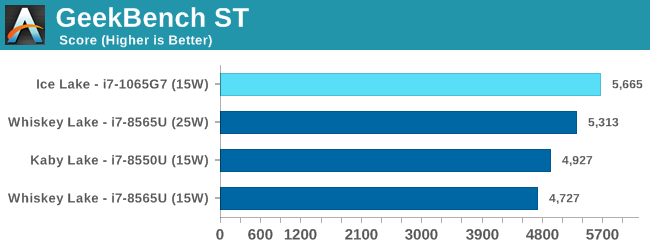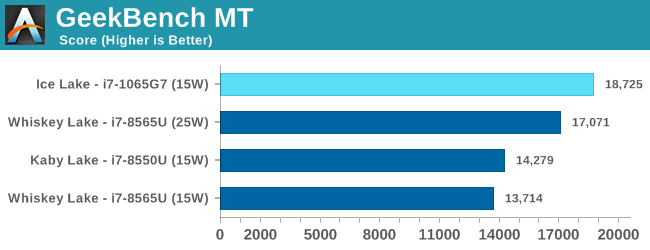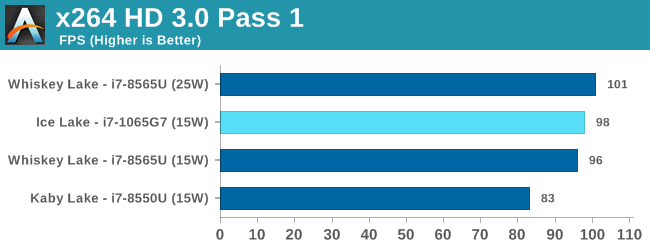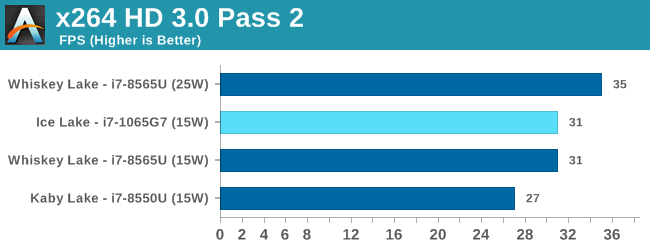The Ice Lake Benchmark Preview: Inside Intel's 10nm
by Dr. Ian Cutress on August 1, 2019 9:00 AM EST- Posted in
- CPUs
- Intel
- GPUs
- 10nm
- Core
- Ice Lake
- Cannon Lake
- Sunny Cove
- 10th Gen Core
Synthetic and Legacy Results (15W)
The realm of synthetic testing is a tricky one, given that there are plenty of benchmarks in the wild that provide a number, but aren’t actually based on real workloads, or are very limited in what they actually test. The issue here is that this software tries to emulate real-world, but it isn’t immersed in the harnesses or matrix of what a user might actually experience. For that reason, we only tend to use these benchmarks based on reader requests.
Legacy benchmarks are included for similar reasons, but can help to get a historical perspective.














261 Comments
View All Comments
Phynaz - Friday, August 2, 2019 - link
An AMD laptop?I’m sorry.
peevee - Friday, August 2, 2019 - link
"The 1065G7 comes quite close to the fastest desktop parts, however it’s likely it’ll need a desktop memory subsystem in order to catch up in total peak absolute performance."What does it mean exactly? How "desktop memory subsystem" differs from this laptop memory other than module size?
Also, there is compatibility with LPDDR4x? Where are SODIMMs for that?
peevee - Friday, August 2, 2019 - link
"The 1065G7 comes quite close to the fastest desktop parts, however it’s likely it’ll need a desktop memory subsystem in order to catch up in total peak absolute performance."What does it mean exactly? How "desktop memory subsystem" differs from this laptop memory other than module size?
Also, there is compatibility with LPDDR4x? Where are SODIMMs for that?
Phynaz - Friday, August 2, 2019 - link
People on the internet need to learn how to use google.ilkhan - Friday, August 2, 2019 - link
At this point I'm still confused if I should be looking for an Ice Lake laptop come christmas, but more objective testing is always a good thing. Thanks Ian.Farfolomew - Friday, August 2, 2019 - link
is anyone else irked by Intel’s naming scheme for the Y-series processors? They’re not even ‘Y’ series marked anymore; that’s a thing of the past! They’re now ‘0’ series (zero), and extremely hard to tell at that.Obviously since Broadwell, and the introduction of Core M, intel marketing has been trying to get rid of that brand. Well now they’ve pretty much accomplished that.
HStewart - Friday, August 2, 2019 - link
Well I think Core M is officially gone with this version. Naming convention make since - note that none of Core M processors including Skylake Y series ever had quad cores. Big difference is power difference 0 series are 9V while U is 15/28 and also 28. It will be interesting comparing Core i7-1065G7 vs Core i7-1060G7 with only differences appearing to be Watts and FreqIn my opinion what is worst is AMD coming out with Ryzen 7, 5, 3 … making people think they have same as i7, i5, i3,,,
Arbie - Friday, August 2, 2019 - link
Yeah, everybody has been wildly misled by that numbering. When I bought my R7 1800X I thought it would be just like an i7. But instead I got twice the cores, threads, and cache. I hate it when that happens...Thunder 57 - Friday, August 2, 2019 - link
Hahaha, thanks, that was great! Well done.Phynaz - Saturday, August 3, 2019 - link
And yet it as slower than the i7. Maybe there’s more to performance than more stuff.